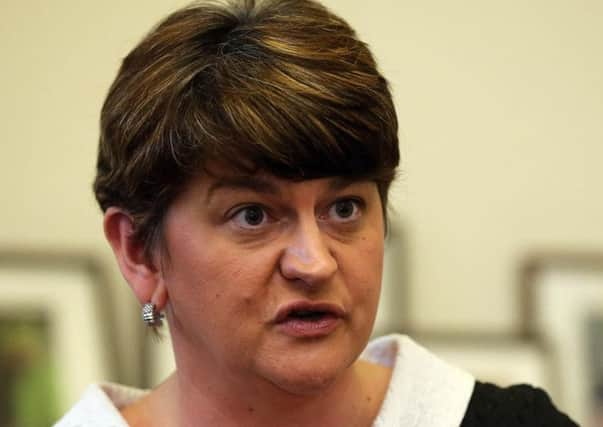Sam McBride: DUP trying to sell Irish language act U-turn as a victory


The DUP, emboldened after taking almost 300,000 votes in the general election and this week’s £1 billion deal with the Tories, appears to believe that it can pull off such a U-turn while claiming that it is actually a great leap forward for unionism.
It is just four months since Arlene Foster categorically ruled out an Irish language act in lurid terms. When asked about the issue in February, Mrs Foster said, to cheers from DUP candidates: “I will never accede to an Irish language act.”
Advertisement
Hide AdAdvertisement
Hide AdShe said that more people in Northern Ireland speak Polish than Irish and then went on: “This characterisation that we should have given something to Sinn Fein to keep them appeased is [with emphasis] not the way I do business. If you feed a crocodile, they’re going to keep coming back and looking for more.”
Those words have dogged Mrs Foster, enraging and reawakening what had been a largely slumbering nationalist electorate, and contributed to unionism losing its Stormont majority for the first time ever.
But another significance of the ‘crocodile’ reference was that it showed political thinking behind the DUP’s stance: Mrs Foster not only opposed an Irish language act as a matter of policy, but she believed that if they conceded that then further demands would be made.
She has since expressed regret for the ‘crocodile’ term about Sinn Fein – which quickly morphed into an inaccurate claim that she had used the word about Irish speakers – but it is difficult to set aside the political analysis behind it.
Advertisement
Hide AdAdvertisement
Hide AdOver recent weeks, it has become increasingly clear that the DUP is prepared to make significant compromises on the Irish language in order to get back into Stormont.
DUP sources have indicated that the party is likely to concede on the language issue, but not in other areas such as the demand that Mrs Foster stands aside as first minister. Those in other parties speak of the DUP making significant movement on the issue in the talks.
At the start of May, in response to a question from the News Letter, Mrs Foster appeared to drop her party’s opposition to an Irish language act but suggested that it may demand some recognition for Ulster Scots, Orangeism and the British identity.
The next day party hardliner Gregory Campbell said: “There will be no Irish language act. We have said that all along and that is what we are saying now,” although he went on to say that there could be merit in a cultural act.
Advertisement
Hide AdAdvertisement
Hide AdNow former DUP leader Peter Robinson – who appears to have been more involved with the party leadership in recent weeks – has weighed in with a statement which attempts to reframe the debate.
In a Facebook post yesterday, Mr Robinson said it was “entirely legitimate” for Sinn Fein to press for an Irish language act, but stressed that all cultures needed to be respected.
Then, effectively giving his seal to an Irish language act in all but name, Mr Robinson called for a “sensible deal”, adding: “Who can complain if there are those who cherish the Irish Language or who passionately support Ulster Scots culture? Who would find it unacceptable for arrangements to be put on a statutory basis to protect and support both? Both can be accommodated.”
Sinn Fein is still demanding a separate Irish language act but Mr Robinson said that it would be “churlish” to let a deal collapse over that semantic point.
Advertisement
Hide AdAdvertisement
Hide AdThe former first minister’s statement attempts to reframe the battle from between either having an Irish language act or not having one to a battle over the title of the act and whether it also incorporates some protection for Ulster Scots.
If the DUP can emerge with a ‘cultural act’ which involved an Irish language act and some Ulster Scots provisions, the DUP is now preparing the ground to trumpet that as a victory.
But not all in the DUP will accept this political sleight of hand.
I understand that the issue was vigorously debated at the party’s executive meeting last Thursday and that some senior figures are deeply alarmed at what they believe is imminent.
Mrs Foster will need all of the political capital which she has amassed with this week’s £1 billion Tory deal in order to carry her party behind this compromise.